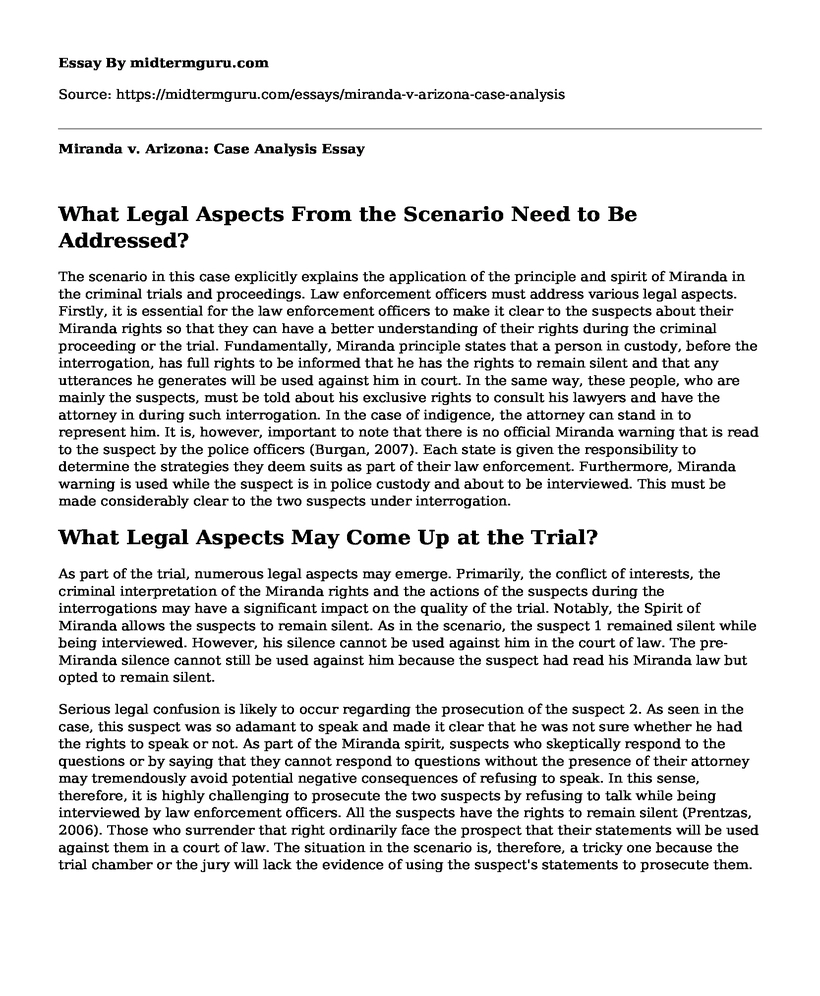What Legal Aspects From the Scenario Need to Be Addressed?
The scenario in this case explicitly explains the application of the principle and spirit of Miranda in the criminal trials and proceedings. Law enforcement officers must address various legal aspects. Firstly, it is essential for the law enforcement officers to make it clear to the suspects about their Miranda rights so that they can have a better understanding of their rights during the criminal proceeding or the trial. Fundamentally, Miranda principle states that a person in custody, before the interrogation, has full rights to be informed that he has the rights to remain silent and that any utterances he generates will be used against him in court. In the same way, these people, who are mainly the suspects, must be told about his exclusive rights to consult his lawyers and have the attorney in during such interrogation. In the case of indigence, the attorney can stand in to represent him. It is, however, important to note that there is no official Miranda warning that is read to the suspect by the police officers (Burgan, 2007). Each state is given the responsibility to determine the strategies they deem suits as part of their law enforcement. Furthermore, Miranda warning is used while the suspect is in police custody and about to be interviewed. This must be made considerably clear to the two suspects under interrogation.
What Legal Aspects May Come Up at the Trial?
As part of the trial, numerous legal aspects may emerge. Primarily, the conflict of interests, the criminal interpretation of the Miranda rights and the actions of the suspects during the interrogations may have a significant impact on the quality of the trial. Notably, the Spirit of Miranda allows the suspects to remain silent. As in the scenario, the suspect 1 remained silent while being interviewed. However, his silence cannot be used against him in the court of law. The pre-Miranda silence cannot still be used against him because the suspect had read his Miranda law but opted to remain silent.
Serious legal confusion is likely to occur regarding the prosecution of the suspect 2. As seen in the case, this suspect was so adamant to speak and made it clear that he was not sure whether he had the rights to speak or not. As part of the Miranda spirit, suspects who skeptically respond to the questions or by saying that they cannot respond to questions without the presence of their attorney may tremendously avoid potential negative consequences of refusing to speak. In this sense, therefore, it is highly challenging to prosecute the two suspects by refusing to talk while being interviewed by law enforcement officers. All the suspects have the rights to remain silent (Prentzas, 2006). Those who surrender that right ordinarily face the prospect that their statements will be used against them in a court of law. The situation in the scenario is, therefore, a tricky one because the trial chamber or the jury will lack the evidence of using the suspect's statements to prosecute them.
The Statement “I Am Not Sure if I Want to Talk Anymore.”
The statement I am not sure if I want to talk anymore is not sufficient for the police to invoke the Miranda rights of the suspects. The suspects have the rights to have legal counsel present at the time of interrogation. Besides, he must be being informed that he or she has the rights to consult an attorney and have him present before answering any question (Burgan, 2007). The police must, therefore, stop the interrogation if the suspect says that he is unsure that he should proceed to speak and avail an attorney to the suspect.
References
Burgan, M. (2007). Miranda v. Arizona: The rights of the accused. Minneapolis, Minn: Compass Point Books.
Prentzas, G. S. (2006). Miranda rights: Protecting the rights of the accused. New York, NY: Rosen Pub. Group.
Cite this page
Miranda v. Arizona: Case Analysis. (2022, Oct 01). Retrieved from https://midtermguru.com/essays/miranda-v-arizona-case-analysis
If you are the original author of this essay and no longer wish to have it published on the midtermguru.com website, please click below to request its removal:
- Paper Example on Juvenile Delinquency Treatment
- Paper Example on Modern Policing
- Essay Sample on Free Movements of Persons
- Criminal Justice System: Ensuring Safety & Well-Being of Society - Essay Sample
- 2018 Bexar County Survey: 1.99M Population, 53.9K Median Income - Essay Sample
- US: High Crime, High Inequality - Ecological Theory Explains Why - Essay Sample
- United Nations and Humanitarian Assistance - Essay Sample







